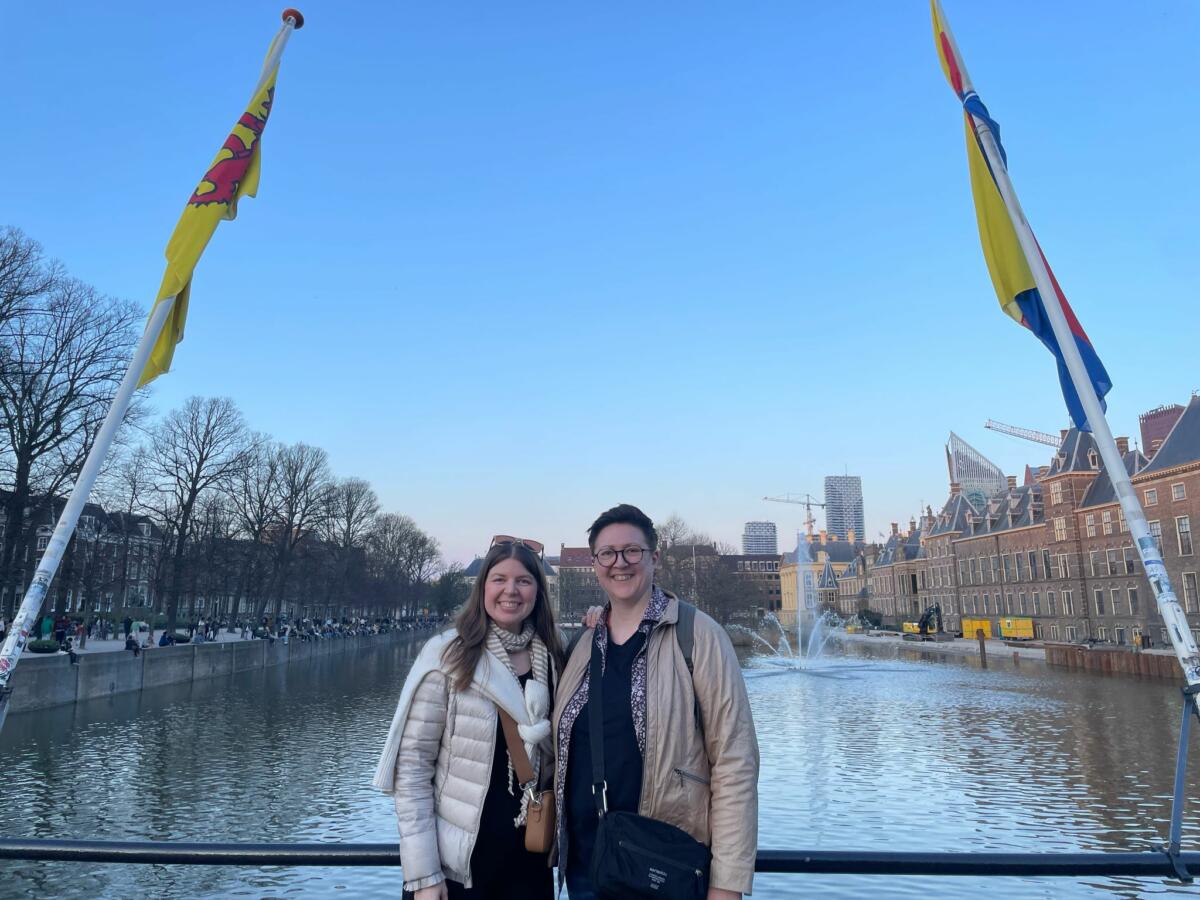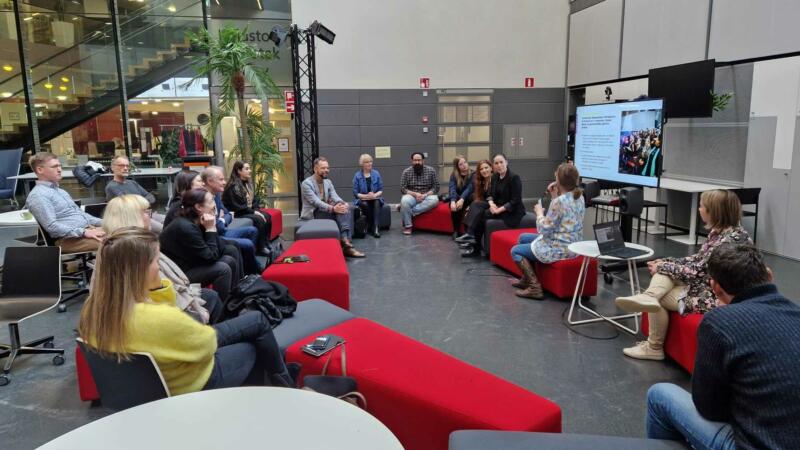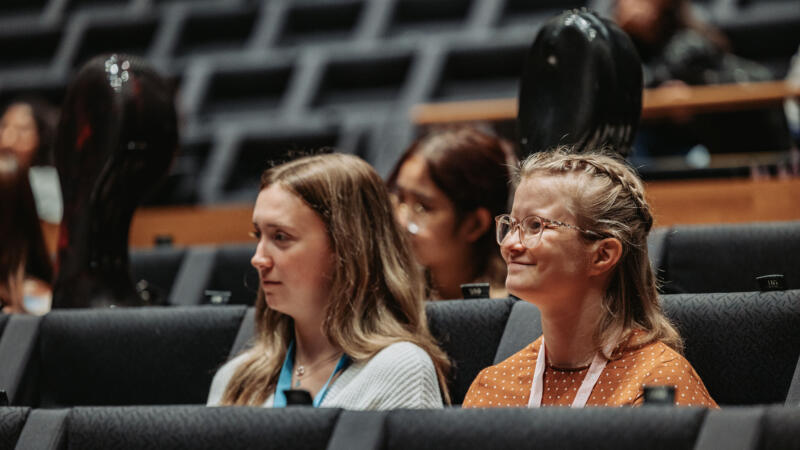The European university alliance’s Artist as Teacher course inspires teachers to reflect on musicianship, learning and pedagogy
Artist as Teacher is the first professional development course within the IN.TUNE university alliance, designed for music educators at all career stages. For pop/jazz vocal lecturer Elina Arlin and Global Music lecturer Puro Paju, the course has provided a unique opportunity to explore and articulate their teaching philosophies and working methods in collaboration with an international network of colleagues.

The Artist as Teacher course, originally developed by the Royal Conservatoire, The Hague, in 2014, was opened to teachers from all IN.TUNE alliance partner universities in the fall of 2024. From Uniarts Helsinki, Sibelius Academy lecturers Elina Arlin (pop/jazz singing) and Puro Paju (Global Music) joined the programme.
“The course title was intriguing because both performing and teaching always ‘happen’ through one’s own personality. Both are about interaction,” says Elina Arlin.
Core themes include the teacher’s artistic and pedagogical identity, providing constructive feedback and developing assessment methods, as well as creating a safe learning environment. Other important topics focus on strengthening students’ ownership of their learning process, integrating artistic research into teaching and addressing the evolving demands of the professional field.
“Pedagogy is an art form in itself. I’m passionate about it because I’m interested in people and their learning processes. Both artistry and pedagogy involve performance and improvisation. I have always wanted to do both,” says Puro Paju.
According to Paju, these two aspects also complement each other. Building strong connections with people is a key skill, whether in a teaching situation, in a band or on stage.
“Pedagogical competence is also at the core of our Global Music programme because we do not train students for a specific profession, but rather for a holistic musicianship that involves exploration and societal engagement. What tools do you need to share your expertise and create meaningful connections between people?” they reflect.
Immediate feedback from a fellow teacher
The four-month-long course consists of ten sessions, including four online sessions and six in-person sessions in The Hague. Participants also observe each other’s teaching and reflect on their own learning history, the course’s impact and collegial learning through written assignments.
“Observing my colleagues’ teaching has been incredibly valuable. I’ve gained inspiration and concrete ideas that I can apply directly to my own teaching,” says Elina Arlin.
“This kind of peer observation could be beneficial within our own institution as well,” adds Puro Paju.
Paju and Arlin have noticed that pedagogical thinking is largely similar across different disciplines at partner institutions.
“We want students to be motivated, encouraged and to feel that they are growing and developing. Now, I’ve had the opportunity to receive open feedback from a colleague on whether I’m achieving these goals in my teaching,” Paju explains.
What is usually an internal dialogue turns into a genuine conversation with a colleague – someone who acts as a mirror and provides immediate feedback.
“When someone else observes and comments on the exact values or tangible outcomes I aim to convey through my pedagogical choices, it has an immediate impact. It reinforces that what I’m doing is working,” Paju says.
An unexpected connection with a Norwegian colleague specialising in rhythm and improvisation led to such an engaging exchange that he recently travelled to Helsinki at his own expense to continue the conversation with Paju.
Different approaches to assessment
In addition to similarities, the course has also highlighted differences in institutional cultures and values among universities.
“These differences emerge in various areas, such as recognising power structures and perceptions of the roles of teachers and students. Is the relationship more coaching-oriented, or is it based on a position of authority?” Paju reflects.
Differences are also evident in assessment practices.
“Most participants in the course come from a classical music background, where detailed assessment criteria are commonly used across different instruments. In Global Music, however, defining such detailed criteria is challenging because artistic foundations vary widely between cultural traditions. Assessment is largely a collegial discussion,” Paju explains.
Arlin shares this perspective, emphasising that in the pop/jazz vocal studies within the Music Education programme, students can excel in very different ways within the same assessment criteria. Each student is seen as an individual, and their unique artistic voice is considered in the evaluation process.
“Assessment is also much more than just feedback given after a performance evaluation,” Arlin reminds.
A common principle across all institutions is that a teacher’s personal preferences must not influence assessment in any way.
A research-oriented mindset
Arlin and Paju feel that the course has reinforced many of the practices valued at the Sibelius Academy.
“We have clear guidelines for building a safe learning environment and providing feedback. The importance of these aspects is well understood and strongly integrated into teaching,” Arlin says.
The course has also helped Arlin recognise the central role of research at the Academy.
“Doctoral programmes have been part of our academy for decades. Teachers conduct research as part of their regular work, and for example, music education students engage in extensive written assignments from the very beginning of their studies,” she describes.
“Research is not just about reading and applying academic articles; we have a strong research-oriented mindset throughout our degree programme. We explore together with students – whether it’s about how a final concert comes together or any other process – it’s a journey of discovery.”
Reflections on one’s own path
The Artist as Teacher course has provided Arlin and Paju with a unique vantage point on the development of music education.
“Global Music is a young and evolving programme that has made unconventional choices. This course has given me the opportunity to evaluate these choices from a broader perspective. I’ve been able to build a comprehensive view of artistry and teaching alongside a diverse group of colleagues – understanding how everything connects and what it means for my own work, our university and its values,” Paju says.
Arlin has always considered developing pedagogy important, but this experience has allowed her to systematically deepen her understanding of key pedagogical themes and questions, reflecting them against her own concepts and methods.
“I’ve had to articulate my thoughts and share them with others, which has clarified my thinking. Even though many ideas have been present in some way, putting them into words and making them consciously visible has been extremely valuable,” she concludes.
At the same time, this process has led both Arlin and Paju to deeply examine their musicianship and learning experiences. It has given them the opportunity to reflect on their own journey all the way from childhood – something that rarely happens without an external prompt.
*
Elina Arlin
Elina Arlin is a musician, singer and lecturer in pop/jazz vocals at the Department of Music Education of the Sibelius Academy, Uniarts Helsinki. Specialising in vocal pedagogy, she combines her teaching with composing music for Einoa, a band that sets Eino Leino’s poetry to music, and performs as a freelance musician. She is also a member of Megasakki, an Emma Award-winning band specialising in rhythm music.
Arlin is currently working on a doctoral research project on vocal expression pedagogy alongside her colleague, Katri Liira, also a lecturer in pop/jazz vocals.
Puro Paju
Puro Paju is a bass player, multi-instrumentalist, composer and arranger specialising in Latin American and African rhythmic traditions. They serve as the coordinating teacher for pedagogy and global rhythmics at the Department of Global Music at the Sibelius Academy. Paju also teaches bass playing, ensembles and improvisation, while actively participating in the department’s diverse community engagement projects.
Alongside teaching, Paju performs with Vili Mustalampi ja Los Fabulosos and takes part in musical theatre productions.
IN.TUNE
IN.TUNE is the only European University Alliance dedicated to music and arts, uniting eight universities to inspire innovation and collaboration. With a strong artistic vision, it fosters high-quality education, research and societal impact. IN.TUNE is funded by the European Commission for a four-year period in 2024-2027.
Learn more about the IN.TUNE university alliance here.

